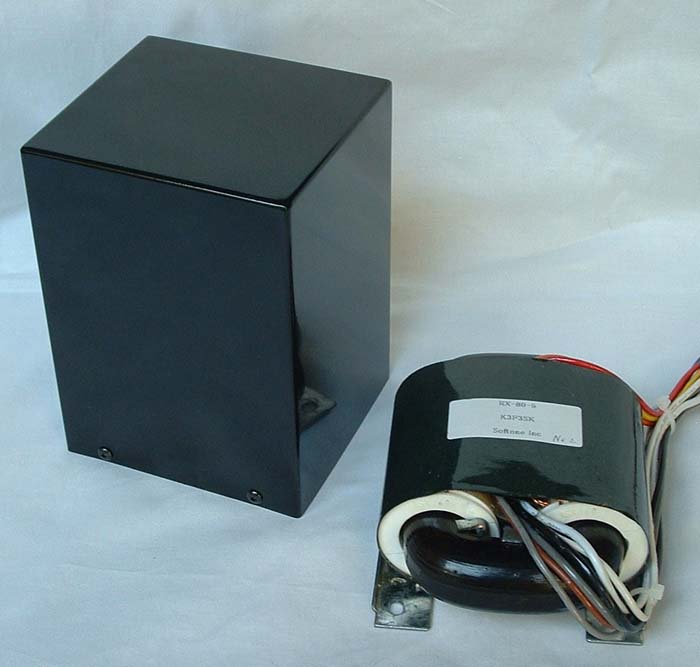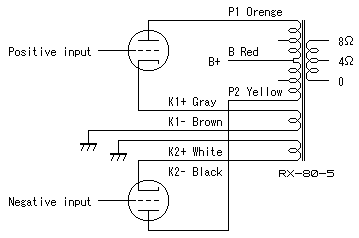
The right on the photo is the R core output transformer in bare condition. The product is enclosed in the square case on the left.

The right on the photo is the R core output transformer in bare condition.
The product is enclosed in the square case on the left.
RX-80-5 is R core audio output transformer for push-pull type amplifier. Excellent magnetic properties of R core as well as precisely wound construction of the coil by the computerized manufacturing system achieve the wide bandwidth, low distortion, and low magnetic loss of the transformer.
| Type | Push-Pull Output Transformer |
| Output capacity | 80W/35Hz |
| Primary impedance | 5,000 ohms, with UL tap (50%) |
| Secondary impedance | 4 and 8 ohms |
| 3rd. | cathode feedback winding 16 ohms X 2 |
| Frequency bandwidth | 2.7Hz to 50KHz (-1dB), input=4V, signal source impedance=5,000 ohms |
| Primary inductance (H) | 120H(min.), 860H(max.) |
| Primary permissible DC current | 280mA (for 2 tubes) |
| Primary permissible unbalanced DC current | 6mA (recommended within 4mA) |
| Power loss | 0.23dB 8ohms |
| DC resistance | Primary P1 to P2 : 168ohms Secondary 0 to 8 ohms : 0.17ohms 3rd. 0 to 16 ohms : 4.18 ohms |
| Dielectric withstanding voltage between primary, secondary and 3rd. . | 2KV AC |
| Maximum permissible voltage of primary P-P | 1KV AC |
| Core | Type R160 160W core |
| Shape | Enclosed in square case, the same mounting dimensions as those of Tango XE60,FC-30 |
| Connections | Lead wires |
| Overall dimensions and weight | W: 110mm, D: 100mm, H: 150mm, Wt.: 3Kg W: 4.33inch, D: 3.94inch, H: 5.91inch, Wt.: 6.6lbs. |
| Case color | black, silver |
| Price | US$220 (excluding tax and shipping) |
When using the cathode feed back winding, the connection of primary winding and cathode feedback winding is as follows. In the case of self-bias, a self-bias resistance and a bypass capacitor are connected between K1-Brown and a ground and between K2+ white and a ground.

Calculating the closed-loop gain and feedback ratio
The load of the output tube is both the primary winding and cathode feedback winding in the cathode feedback circuit.
The load impedance of the output tube is not 1.25K ohms of a usual pp circuit
(1/4 of 5K ohms).
The load impedance is as follows.
Rl = ( SQRT(1250) + SQRT(16) ) **2 = 1548 ohms
SQRT : Square route operation
** : Factorial operation
The open-loop gain on the primary side before feedback
Aopen = gm * ( 1548 // Rp )
gm : Transconductance of the output tube
Rp : Plate resistance of the output tube
// : Parallel value operation
The feedback factor β is a voltage ratio (a winding ratio) of load Rl
and the cathode winding .
β = SQRT ( 16 / 1548 ) = 0.102
The closed loop gain on the primary side after feedback
Aclosed = Aopen / ( 1 + Aopen * β )
Feedback ratio = 20 * log( Aopen / Aclosed ) dB
Example
Value that uses EL34(6CA7) for output tube
gm of EL34 = 11000uS
Rp of EL34 = 15000 ohms
The open-loop gain on the primary side before feedback
Aopen = gm * ( 1548 // Rp )
= 11000 * 10**-6 ( 1548 // 15000 )
= 11000 * 10**-6 * 1403
= 11 * 1.403 = 15.43
The closed loop gain on the primary side after feedback
Aclosed = Aopen / ( 1 + Aopen * β )
= 15.43 / ( 1 + 15.43 * 0.102 )
= 15.43 / 2.57 = 6.07
The feedback ratio
Feedback ratio = 20 * log( Aopen / Aclosed ) dB
= 20 * log( 15.43 / 6.07 ) = 8.2 dB
1. Frequency Characteristics
The first graph below shows the wide bandwidth 2.7Hz to 50KHz (-1db) and plain attenuation characteristic without any peculiar peaks and dips at the high frequency.
2. Frequency Characteristic: with different signal source impedances
The frequency characteristic of the audio output transformer varies with the signal source impedance that drives the transformer. In general, the bandwidth broadens in a lower signal source impedance. The bandwidth narrows in a higher signal source impedance. The figure below is the frequency response when it drives by 1.2K ohms signal source impedance like triode power tubes and when it drives by 20K ohms signal source impedance like beam power tubes.
Frequency bandwidth by signal source impedance
| Signal source impedance | Bandwidth |
| 5K ohms (Standard) | 2.7Hz to 50KHz -1dB |
| 1.2K ohms (Triode tubes) | 0.7Hz to 70KHz -1dB |
| 20K ohms (beam tubes) | 3.8Hz to 35KHz -1dB |
3. Phase Characteristic
4. Primary impedance Characteristic
5. Cathode feedback winding Frequency Characteristics
6. Cathode feedback winding Phase Characteristic
7. Primary Inductance Characteristic
The primary inductance of the push-pull output transformer very much influences the low frequency response. This primary inductance varies according to the magnitude of the signal level and unbalanced DC current level. The more the primary inductance increases and the less it varies, the more solid and stable sound quality can be obtained.
The primary inductance of RX-80-5 audio output transformer is very large,
being 120H at minimum and 860H at maximum. Furthermore, the fluctuation
of the inductance is quite small assuring good total performance.
However, the existence of the unbalanced DC current reduces drastically
the primary inductance. Although the service limit of the unbalanced DC
current is 6mA, we recommend reducing this unbalance down to 3mA or less
in order to make maximum use of this R core output transformer.